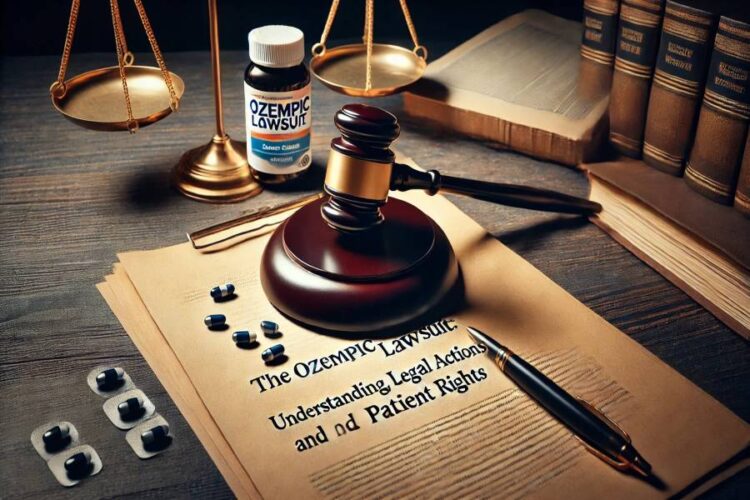Ozempic, a game changer in treating Type 2 diabetes and weight management, has rapidly gained traction worldwide. This GLP-1 receptor agonist helps regulate blood sugar levels and has been celebrated for its weight loss benefits. However, with soaring popularity comes intense scrutiny.
Recently, Ozempic has been under the legal spotlight due to many reports concerning serious side effects. This growing concern has sparked discussions about patient rights and the responsibilities of pharmaceutical companies.
Understanding the claims, legal actions, and broader implications for patients becomes crucial as we delve deeper.
This article aims to open up the complexities surrounding Ozempic, providing a clear overview of the situation from a legal and healthcare perspective.
Background On Ozempic and Related Medications
GLP-1 receptor agonists, like Ozempic, represent a significant advancement in modern medicine. These drugs mimic the glucagon-like peptide-1 hormone, which helps control blood sugar and appetite.
As a result, they offer dual benefits: improved glycemic control and weight loss, making them highly sought after in the healthcare community and among patients with Type 2 diabetes. Ozempic, in particular, has been widely adopted due to its efficacy and the added advantage of significant weight reduction in patients. Its reception, initially positive, has seen a paradigm shift as more patients report severe side effects, ranging from minor gastrointestinal problems to more severe complications.
The escalation in reports has not only led to increased medical scrutiny but also raised questions about the long-term safety of these medications.
As the situation unfolds, the medical community and regulatory bodies look closer to balancing the benefits of GLP-1 receptor agonists with the potential risks they pose to patient health.
The Legal Challenges
As Ozempic’s popularity skyrockets, so do the legal battles surrounding its adverse effects. A notable increase in lawsuits has been centered on severe gastrointestinal injuries and, more recently, concerning allegations of vision loss among users.
These legal actions highlight the severe side effects that some patients experience, which they claim were not adequately disclosed by Novo Nordisk, the drug’s manufacturer. A significant legal development occurred in response to the growing number of cases: the consolidation of individual lawsuits into multidistrict litigation (MDL).
This MDL has been established in the Eastern District of Pennsylvania, aiming to streamline the process by collectively handling numerous similar legal claims.
This consolidation is a critical step in addressing the allegations efficiently and underscores the scale and severity of the alleged injuries linked to Ozempic.
Claims and Allegations
The health complaints associated with Ozempic are severe and life-altering. Among the most reported issues is gastroparesis—a condition that slows or stops food movement from the stomach to the small intestine, leading to severe digestive problems.
Additionally, patients have reported cases of bowel obstructions and nonarteritic anterior ischemic optic neuropathy (NAION), a sudden loss of vision. These side effects form the core of the allegations against Novo Nordisk. Plaintiffs argue that the company failed to provide adequate warnings about the risk of these severe side effects, potentially compromising patient safety.
Legal advocates and affected patients are pushing for greater transparency and accountability, insisting that Novo Nordisk should have done more to warn users and the medical community about the risks associated with Ozempic.
The mounting lawsuits and the formation of the MDL reflect a critical turning point in how these claims are addressed, spotlighting the need for stringent safety disclosures in pharmaceutical practices.
Legal Proceedings and Updates
The legal landscape surrounding Ozempic is evolving rapidly, marked by significant milestones and judicial decisions. The appointment of a judge to oversee the MDL in the Eastern District of Pennsylvania was a pivotal moment, setting the stage for a structured and coordinated legal process.
This judicial leadership is crucial as it ensures that pretrial proceedings are handled efficiently, with clear directives and timelines. As the litigation progresses, several critical court decisions have already shaped the trajectory of the cases. These rulings, focusing on the admissibility of evidence and the scope of claims that can be pursued, are critical in determining how the lawsuits will unfold.
The ongoing status of the MDL remains active, with lawyers from both sides preparing for potentially lengthy proceedings. Each legal update brings the cases closer to resolution, whether through court decisions, settlements, or other legal means, affecting the parties involved and setting precedents for how similar cases might be handled in the future.
Patient Stories and Case Studies
Behind the legal jargon and the court dates are the real stories of individuals whose lives have been significantly altered by Ozempic’s side effects. One such case is that of a middle-aged woman who developed severe gastroparesis after starting Ozempic for weight loss, leading to prolonged hospital stays and a drastic change in her lifestyle.
Another case involves a young professional who suffered from NAION, resulting in partial vision loss that affected his career and daily activities.
These stories underscore the human element of the litigation, highlighting the profound impact that unforeseen side effects can have on health and well-being. These personal accounts not only provide a face to the statistics but also emphasize the urgency and importance of addressing the claims thoroughly and compassionately.
As these stories are shared and heard in courtrooms or through media, they foster a deeper understanding of the stakes involved and the need for stringent safety measures and more precise patient communication in the pharmaceutical industry.
Legal Rights and Advice for Patients
If you’ve experienced severe side effects from Ozempic, consider legal options. To qualify for joining the ongoing Ozempic lawsuit, you should have documented medical records of side effects linked directly to Ozempic.
Seeking the guidance of a lawyer experienced in pharmaceutical litigation is crucial. These attorneys are well-versed in the complexities of drug-related lawsuits and can offer comprehensive advice on the necessary steps to file a claim. They will help you understand your rights, evaluate the strength of your case, and guide you through the legal process, ensuring that your voice is heard and your grievances are addressed effectively.
Implications for Pharmaceutical Ethics and Patient Safety
Pharmaceutical companies have a profound ethical responsibility to ensure the safety of their medications. The ongoing Ozempic lawsuits underline the critical importance of comprehensive drug testing and transparent communication about potential risks.
These cases raise significant concerns about patient safety and trust in the pharmaceutical industry, spotlighting the need for stringent regulatory oversight and ethical practices that prioritize patient well-being over profits.
Conclusion
This exploration of the Ozempic lawsuits reveals the multifaceted challenges and implications of pharmaceutical practices. The legal proceedings, patient stories, and ethical considerations discussed underscore the complex interplay between drug safety, corporate responsibility, and patient rights. As the legal battles unfold, they seek justice for affected individuals and set important precedents for the future of pharmaceutical ethics and patient care. The outcomes of these cases will likely influence how drug safety is managed and how companies engage with patients and the broader healthcare community moving forward.
For further information on when you might need legal assistance, visit Signs You Need a Personal Injury Lawyer.










